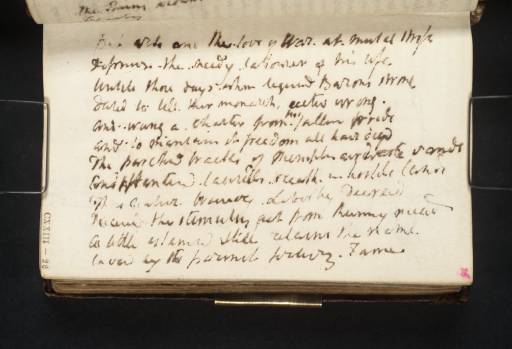Joseph Mallord William Turner Inscription by Turner: Draft of Poetry 1811
Joseph Mallord William Turner,
Inscription by Turner: Draft of Poetry
1811
Joseph Mallord William Turner 1775–1851
Folio 26 Recto:
Inscription by Turner: Draft of Poetry 1811
D08410
Turner Bequest CXXIII 26
Turner Bequest CXXIII 26
Inscribed by Turner in ink (see main catalogue entry) on white wove writing paper, 75 x 117 mm
Inscribed by John Ruskin in red ink ‘26’ bottom right, descending vertically
Stamped in black ‘CXXIII – 26’ bottom left, descending vertically
Inscribed by John Ruskin in red ink ‘26’ bottom right, descending vertically
Stamped in black ‘CXXIII – 26’ bottom left, descending vertically
Accepted by the nation as part of the Turner Bequest 1856
References
1862
Walter Thornbury, The Life of J.M.W. Turner, R.A. Founded on Letters and Papers Furnished by his Friends and Fellow-Academicians, London 1862, vol.II, p.18.
1897
Walter Thornbury, The Life of J.M.W. Turner, R.A. Founded on Letters and Papers Furnished by his Friends and Fellow-Academicians: A New Edition, Revised with 8 Coloured Illustrations after Turner’s Originals and 2 Woodcuts, London 1897, p.206.
1909
A.J. Finberg, A Complete Inventory of the Drawings of the Turner Bequest, London 1909, vol.I, p.345, CXXIII 26, as ‘Verses’.
1966
Jack Lindsay, The Sunset Ship: The Poems of J.M.W. Turner, Lowestoft 1966, p.109 (Lindsay 1966a).
1966
Jack Lindsay, J.M.W. Turner: His Life and Work: A Critical Biography, London 1966, p.137 (Lindsay 1966b).
1987
John Gage, J.M.W. Turner: ‘A Wonderful Range of Mind’, New Haven and London 1987, pp.44, 246 note 16.
1990
Andrew Wilton and Rosalind Mallord Turner, Painting and Poetry: Turner’s ‘Verse Book’ and his Work of 1804–1812, exhibition catalogue, Tate Gallery, London 1990, p.170.
1997
Anthony Bailey, Standing in the Sun: A Life of J.M.W. Turner, London 1997, p.221.
2003
James Hamilton, Turner’s Britain, exhibition catalogue, Gas Hall, Birmingham Museums & Art Gallery 2003, p.100.
The whole page is taken up with the following lines of verse:
[? ‘But’ or ‘Put’] arts and the love of war at mortal strife
Deprives the needy labourer of his life
Untill those days when leguerd Barons strong
Dared to tell their monarch acted wrong
And wrung a charter from [‘his’ inserted above] fallen pride
And to maintain it freedom all have diyd
The parched tracks of Memphis arid <[?waste]> sands
And planted laurells wreath in hostile lands
Thus native bravery Liberty decreed
Received the stimulus act from Runny mead
A little island still retains the name
laved by its [?parent silvery] Tame1
Deprives the needy labourer of his life
Untill those days when leguerd Barons strong
Dared to tell their monarch acted wrong
And wrung a charter from [‘his’ inserted above] fallen pride
And to maintain it freedom all have diyd
The parched tracks of Memphis arid <[?waste]> sands
And planted laurells wreath in hostile lands
Thus native bravery Liberty decreed
Received the stimulus act from Runny mead
A little island still retains the name
laved by its [?parent silvery] Tame1
Interspersed with drawings and the printed pages of Coltman’s British Itinerary, sixty-nine pages of this sketchbook are given over wholly or partly to these verses which Turner intended as a commentary for publication with the Picturesque Views on the Southern Coast of England which he sketched on the 1811 tour (see the introduction to the sketchbook). The first lines are on folio 18 verso (D08396), and the last on folio 207 verso (D08736; CXXIII 204a).
The previous passage, on folio 25 verso (D08409), charts Turner’s south-west route across Hounslow Heath. Now he recalls how King John sealed the famous constitutional charter Magna Carta at or near the Thames water-meadows at Runnymede, south of Windsor in Berkshire, in 1215,2 and considers ‘the origins of English liberty’.3 Jack Lindsay has suggested that the radical politics of Turner’s patron and friend Walter Fawkes influenced his attitude here;4 Turner still recalled ‘England’s Early Liberty’ in a letter addressed to his friend Mrs Geddes at ‘Runnymeade | Old Windsor’ in 1846.5 He made sketches in the locality at the outset of his West Country tour including those on folios 9 verso, 11 recto, 11 verso and 12 verso (D08379, D08381, D08382, D08384). ‘Memphis’ is presumably an obscure allusion to the Egyptian desert and the classical past. The Runnymede passage continues for a few lines on folio 28 verso (D08414) before the journey continues.
Matthew Imms
June 2011
See transcriptions (followed here with slight variations) in Lindsay 1966a, p.109, all but the last two lines, as ‘Arts and the Love of War’, section (c) of poem no.50, ‘On the Western Itinerary 1811’, and Wilton and Turner 1990, p.170; previously transcribed with variations in Thornbury 1862, II, p.18 and 1897, p.206, and in Lindsay 1966b, p.137 (lines six to ten); penultimate couplet also given in Bailey 1997, p.221.
How to cite
Matthew Imms, ‘Inscription by Turner: Draft of Poetry 1811 by Joseph Mallord William Turner’, catalogue entry, June 2011, in David Blayney Brown (ed.), J.M.W. Turner: Sketchbooks, Drawings and Watercolours, Tate Research Publication, December 2012, https://www

